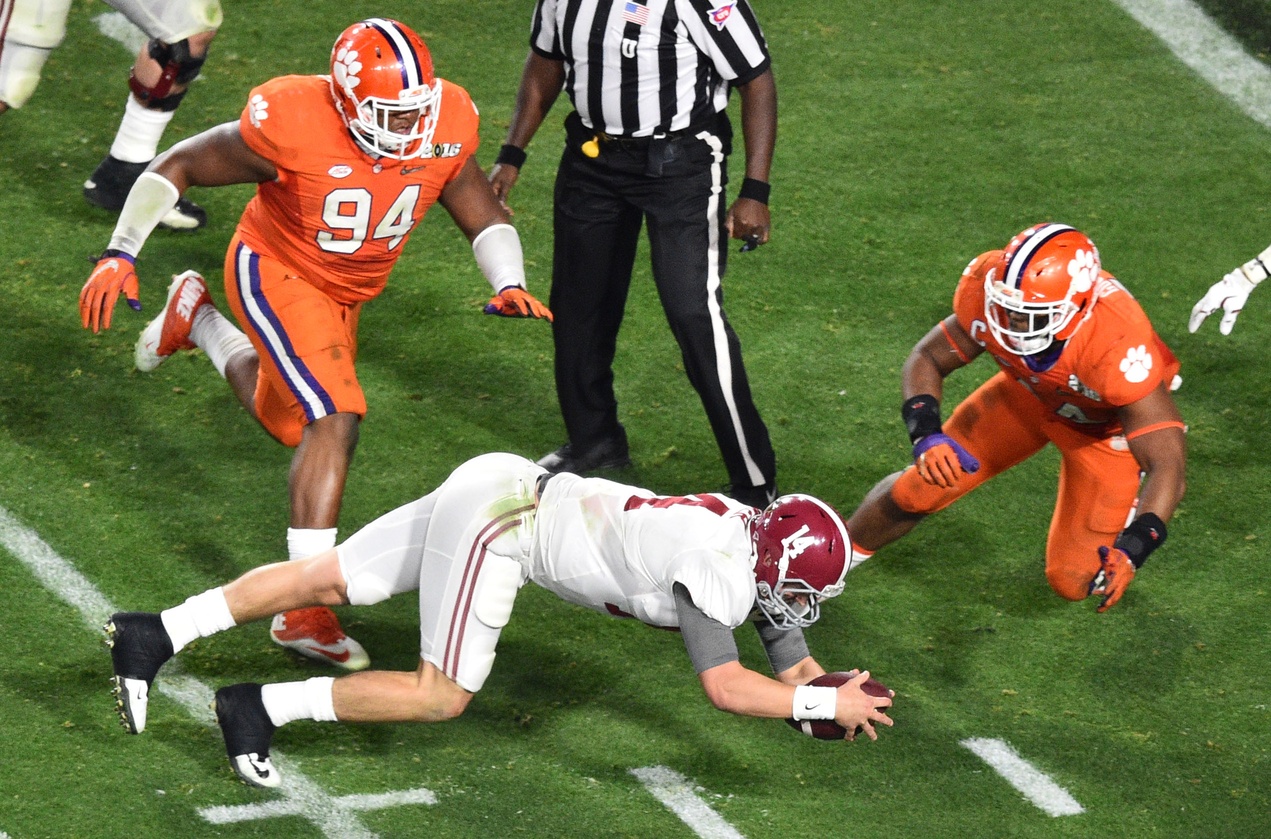
Jake Coker as a pro prospect: Underestimate him at your peril
By Will Heath
Published:
It was probably the play of the game, and it went almost completely unnoticed.
With 2:10 left in the national championship game Monday night, Alabama needed to make one more play to sew up the game. By then they were basically out of big plays — they’d already been the beneficiaries of two touchdown passes of 53 and 51 yards, as well as a 95-yard kickoff return for a score.
Bama was still nursing a five-point lead when, but just for good measure, tight end O.J. Howard had turned a short flip from quarterback Jake Coker into a 63-yard play from scrimmage to set them up inside Clemson’s 20. Now they were facing third-and-3 against a defense that absolutely knew they had to stop them from one more first down to have a chance at coming back.
And so, Lane Kiffin called a play he favored in similar situations for most of 2015. Coker faked a handoff to Derrick Henry, then rolled to his right on the classic run-pass option. The fake didn’t fool anybody, and Coker found himself face-to-face with Clemson defensive end Kevin Dodd.
“Lumbering” is the best way to describe Coker — a 6-foot-5, 232-pounder from Mobile, Ala., who was not recruited to either Florida State or Alabama as an option quarterback. But he showed a befuddling aptitude from scrambling all season from the QB position, and it was as perplexing for fans as it was for opposing defenses.
“How hard can it be to tackle that slow white dude?”
Apparently, harder than you’d think. Because Coker, as Bama fans grew accustomed to seeing all season, simply ducked inside of Dodd — a thorn in his side the entire night as a pass rusher — leaned forward with his big body and dove for the first down. Three plays later, Derrick Henry broke the plane of the Clemson goal line, and Alabama escaped the desert with its fourth national title in seven seasons.
If there was one play from Monday night’s game that summarized Coker’s entire 2015 season at Alabama, it was that one. At no point did anyone mistake the big, slow, strong-armed signal-caller for Cam Newton, or even A.J. McCarron.
He finished the season with a pedestrian 3,110 passing yards, and a completion percentage just north of 66 percent, making him the 34th-rated passer in the nation.
And yet he was an undeniable factor in the Tide’s run to its 16th title this season. He was as tough as he was steady, and for all his limitations as a passer, he never got the team beat. In fact, after a two-interception performance against Arkansas in mid-October, Coker threw only two picks the rest of the season, and none after the Mississippi State game on Nov. 14.
In the season’s two biggest games, Coker completed 75 percent of his throws, for a total of 621 yards, four touchdowns and no interceptions. He did nothing outlandish in the national title game — certainly not on the same level as his counterpart, Deshaun Watson — and yet he did everything necessary to win a championship.
Whether this translates into a professional career is less certain.
ESPN draft expert Mel Kiper noticed him – for whatever that’s worth – and improved his position from “priority free agent” to “late rounder” in the upcoming NFL draft. Kiper specifically cited his in-season improvement, noting that he “became an asset” for the Tide, particularly in the postseason.
It’s hard to imagine Jake Coker as the sort of quarterback that leads a professional team to a Super Bowl.
But not many ever saw him leading Alabama to a national championship. We pegged him wrong from the beginning.
Will Heath is a contributing writer for Saturday Down South. He covers SEC football.






